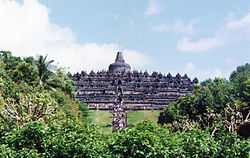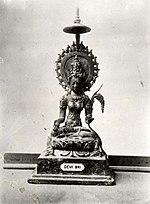
North Sulawesi is a province of Indonesia. It is mainly located on the Minahasa Peninsula of the island of Sulawesi, south of the Philippines and southeast of Sabah, Malaysia, but also includes various small archipelagoes situated between the Minahasa Peninsula and southern Philippines. It borders the Philippines province of Davao Occidental and Soccsksargen regions to the north, the Maluku Sea to the east, Gorontalo and the Celebes Sea to the west and the Gulf of Tomini to the southwest. The province's furthest extent, the outlying and isolated island of Miangas to its north, is the northernmost island of Indonesia as a bordering with the Philippines.

The Minahasans or Minahassa are an indigenous ethnic group from the North Sulawesi province of Indonesia, formerly known as North Celebes. The Minahasa people sometimes refer to themselves as Manado people. Although the Minahasan pre-Christian creation myth entails some form of ethnic unification, before the nineteenth century the Minahasa region was in no way unified. Instead, a number of politically independent groups (walak) existed together, often in a permanent state of conflict.
The Marapu religion is a form of ancestral religion that is practiced mainly in the island of Sumba in Indonesia. Marapu is also practiced in many more remote areas of Sumba and Flores. Both the Christians and Muslims on these islands tend to combine their faiths with Marapu. Since Marapu, like Kaharingan of the Dayaks, is not an official religion of Indonesia, and all Indonesian citizens are required to identify as a member of one of the religions sanctioned by law, members have chosen either Christianity or Islam to self identify.

Kaharingan is an indigenous monotheistic folk religion of the Dayak people such as Katingan, Lawangan, Ma'anyan, Ngaju, Ot Danum people native to the Central Kalimantan and South Kalimantan region in Indonesia.

Islam is the largest religion in Indonesia, with 87.06% of the Indonesian population identifying themselves as Muslims, based on civil registry data in 2023. In terms of denomination, the overwhelming majority are Sunni Muslims; the Pew Research Center estimates them as comprising ~99% of the country's Muslim population in 2011, with the remaining 1% being Shia who are concentrated around Jakarta and about 400,000 Ahmadi as well.

Buddhism has a long history in Indonesia, and it is one of the six recognized religions in the country, along with Islam, Christianity, Hinduism and Confucianism. According to 2023 estimates roughly 0.71% of the total citizens of Indonesia were Buddhists, numbering around 2 million. Most Buddhists are concentrated in Jakarta, Riau, Riau Islands, Bangka Belitung, North Sumatra, and West Kalimantan. These totals, however, are probably inflated, as practitioners of Taoism and Chinese folk religion, which are not considered official religions of Indonesia, likely declared themselves as Buddhists on the most recent census. Today, the majority of Buddhists in Indonesia are Chinese and other East Asians, but small communities of native Buddhists also exist.
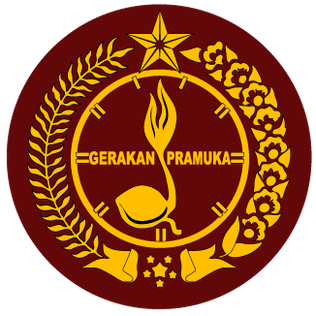
The Pramuka Movement of Indonesia, officially the Praja Muda Karana Scouting Movement, is the national scouting organization of Indonesia. Scouting was founded in the Dutch East Indies in 1912, and Indonesia became a member of the World Organization of the Scout Movement (WOSM) in 1953. Regulated by the Pramuka Movement Act of 2010, all elementary and secondary schools must operate a scouting program; and membership was compulsory for students in elementary and secondary schools from 2013 to 2024. It has 25.272.760 members, making it the world's largest Scout association.
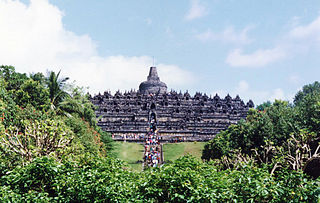
Kejawèn or Javanism, also called Kebatinan, Agama Jawa, and Kepercayaan, is a Javanese cultural tradition, consisting of an amalgam of Animistic, Buddhist, Islamic and Hindu aspects. It is rooted in Javanese history and religiosity, syncretizing aspects of different religions and traditions.

The history of the Jews in Indonesia began with the arrival of early European explorers and settlers, and the first Jews arrived in the 17th century. Most Indonesian Jews arrived from Southern Europe, the United Kingdom, the Netherlands, Belgium, Germany, France, the Middle East, North Africa, India, China, and Latin America. Jews in Indonesia presently form a very small Jewish community of about 500–1,000, from a nadir of about 20 in 1997. Judaism is not recognized as one of the country's six major religions, however its practices are allowed under Perpres 1965 No. 1 and article 29 paragraph 2 of the Constitution of Indonesia. Therefore, members of the local Jewish community have to choose to register as "Belief in One Almighty God" or another recognized religions on their official identity cards.

Indonesians are citizens or people who are identified with the country of Indonesia, regardless of their ethnic or religious background. There are more than 1,300 ethnicities in Indonesia, making it a multicultural archipelagic country with a diversity of languages, culture and religious beliefs. The population of Indonesia according to the 2020 national census was 270.2 million. 56% live on the island of Java, the world's most populous island. Around 95% of Indonesians are Native Indonesians, primarily of Austronesian and Melanesian descent, with 40% Javanese and 15% Sundanese forming the majority, while the other 5% are Indonesians with ancestry from foreign origin, such as Arab Indonesians, Chinese Indonesians, Indian Indonesians, and Indos.

Several different religions are practised in Indonesia. Indonesia is officially a presidential republic and a unitary state without an established state religion. The first principle of Indonesia's philosophical foundation, Pancasila, requires its citizens to state the belief in "the one and almighty God". Although, as explained by the Constitutional Court, this first sila of Pancasila is an explicit recognition of divine substances and meant as a principle on how to live together in a religiously diverse society. Blasphemy is a punishable offence and the Indonesian government has a discriminatory attitude towards its numerous tribal religions, atheist and agnostic citizens. In addition, the Aceh province officially applies Sharia law and is notorious for its discriminatory practices towards religious and sexual minorities.
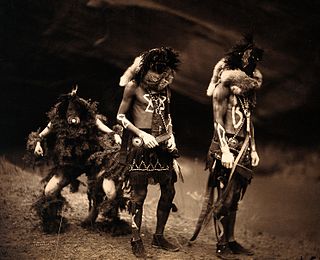
Native American religions, Native American faith or American Indian religions are the indigenous spiritual practices of the Indigenous peoples of the Americas. Ceremonial ways can vary widely and are based on the differing histories and beliefs of individual nations, tribes and bands. Early European explorers describe individual Native American tribes and even small bands as each having their own religious practices. Theology may be monotheistic, polytheistic, henotheistic, animistic, shamanistic, pantheistic or any combination thereof, among others. Traditional beliefs are usually passed down in the oral tradition forms of myths, oral histories, stories, allegories, and principles. Nowadays, as scholars note, many American Natives renew their interest in own tradition.
The Indonesian constitution provides some degree of freedom of religion. The government generally respects religious freedom for the six officially recognized religions and/or folk religion. All religions have equal rights according to the Indonesian laws.
The Indonesian Marhaen People's Union, generally known by its acronym Permai, was a social movement in Indonesia, functioning both as a political party and an Abangan mystical association. The organisation was founded on 17 December 1945. Permai was led and founded by Mei Kartawinata in Cimerta, Pasirkareumbi, Subang, Subang Regency with two friends, M. Rasyid and Sumitra. At its peak on 17 December 1945, It was declared as a political party with J.B. Assa, Iwa Kusumasumantri, Izaak Riwoe Lobo, and S. Karsono Werdojo.
Sukamto Notonagoro was an Indonesian legal scholar and thinker. He is credited as being the first to approach the state philosophy of Pancasila philosophically.
Atheism, or irreligion in Indonesia, is uncommon among the country's inhabitants, as there is a great stigma attached to being an atheist in Indonesia and it is widely condemned by the Indonesian people.

Sanghyang Adi Buddha is a concept of God in Indonesian Buddhism. This term was used by Ashin Jinarakkhita at the time of Buddhist revival in Indonesia in the mid-20th century to reconcile the first principle of the official philosophical foundation of Indonesia (Pancasila), i.e. Ketuhanan Yang Maha Esa that requires the belief in a supreme God, which Buddhism, strictly speaking, does not believe in. This concept is used by the Indonesian Buddhist Council, an organization that seeks to represent all Buddhist traditions in Indonesia such as Theravada, Mahayana, and Vajrayana.

Muhammad Ainun Nadjib, best known as Emha Ainun Nadjib or Cak Nun/Mbah Nun, is an Indonesian poet, essayist, kyai, ulama, and humanist. Born in Jombang, East Java, Nadjib began writing poetry while living in Yogyakarta, publishing his first collection in 1976. He became one of the city's predominant poets by the late 1980s, and by then had also began writing essays. He is the leader of the Kiai Kanjeng group, which stages dramas and musical performances on religious themes.

The Jakarta Charter was a document drawn up by members of the Indonesian Investigating Committee for Preparatory Work for Independence (BPUPK) on 22 June 1945 in Jakarta that later formed the basis of the preamble to the Constitution of Indonesia. The document contained the five principles of the Pancasila ideology, but it also included an obligation for Muslims to abide by Shariah law. This obligation, which was also known as the "Seven Words", was eventually deleted from the enacted constitution after the Indonesian declaration of independence on 18 August 1945. Following the deletion of the "Seven Words" efforts by Islamic parties continued to seek its inclusion, most notably in 1959, when the 1945 constitution was suspended; in 1968, during the Transition to the New Order; and in 2002, following the end of the New Order and the beginning of the Reformasi era.

Pancasila is the official, foundational philosophical theory of Indonesia. The name is made from two words originally derived from Sanskrit: "pañca" ("five") and "śīla".
